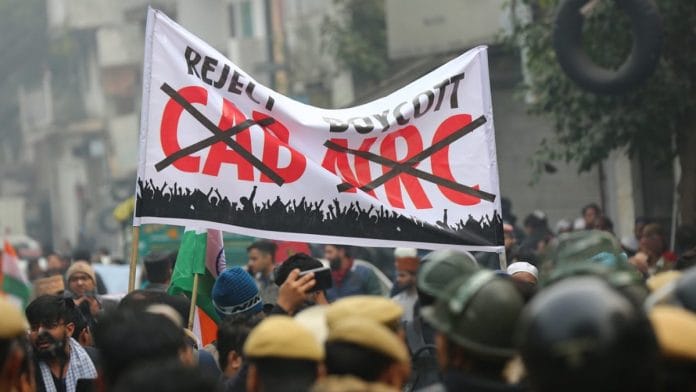New Delhi: The Ministry of Home Affairs (MHA) is “yet to frame” rules that will govern the Citizenship (Amendment) Act, 2019 (CAA), a year since the controversial law was passed by Parliament. The legislation had sparked protests and riots across the country.
Unless the rules are framed and notified, the Act cannot be implemented and practically remains ineffective.
“The rules are yet to be framed. It will be worked on,” a source in MHA said. The officer refused to comment on how long the process is expected to take. “It is a complicated process. It may take a while, we still have time,” the officer said.
The CAA was passed by the Lok Sabha on 9 December 2019 and by the Rajya Sabha on 11 December 2019. It got the President’s nod on 12 December and the MHA issued a notification stating that the Act would come into force from 10 January 2020.
Under the CAA people from six religions — Hindu, Sikh, Buddhist, Jain, Parsi and Christian — who have come from Pakistan, Bangladesh and Afghanistan will be granted citizenship, if they arrived in India before 31 December 2014.
This means that people from these six religions will not be deported for not having valid documents, and instead will be given citizenship. Moreover, all legal proceedings against them for illegally entering India will be closed.
The 2019 amendment does not apply to the tribal areas of Tripura, Mizoram, Assam and Meghalaya because of them being included in the Sixth Schedule of the Constitution.
Areas that fall under the Inner Line Permit notified under the Bengal Eastern Frontier Regulation, 1873, will also be outside the Act’s purview. This keeps almost entire Arunachal Pradesh, Mizoram and Nagaland out of the ambit of the Act.
Two extensions
According to procedure, the respective ministries are to frame rules within six months of passing of the Act for its effective implementation.
In case the ministry concerned is unable to make those rules, they need to seek an extension from the Committee on Subordinate Legislation, which cannot be more than three months at a time. The MHA has until now taken two extensions, ThePrint has learnt.
“In case the ministries/departments are not able to frame the rules within the prescribed period of six months, they should seek extension of time from the Committee on Subordinate Legislation stating reasons for such extension,” the Manual of Parliamentary Procedures says.
“Such extension being not more than for a period of three months at a time. The request should be made after obtaining the approval of the Minister,” it adds.
In this case, MHA had sought one extension in July for three months, that expired in October. Another extension was then sought, which will now expire in January.
“We have time until January and the process is expected to be completed by then,” the source quoted above said.
It is still unclear the reasons the MHA listed for the two extensions it sought.
After the rules are finalised, steps will then be taken by the ministry or department concerned to publish them in the official gazette and, where the Act provides for it, to lay them on the Table of each House.
Also read: Anti-CAA protesters wanted to engineer Delhi riots, not just block roads, says charge sheet







Wonderful. May the exercise be taken up after a few decades. When Bangladesh’s per capita income crosses $ 10,000.